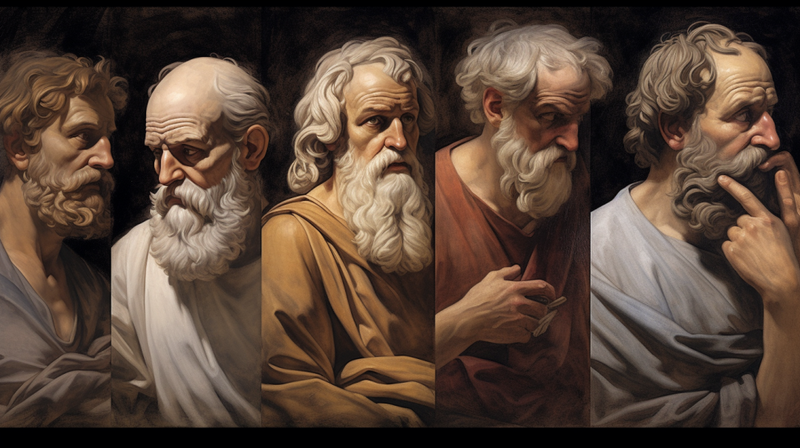The Search for Truth: Perspectives from Ancient Philosophers to Postmodern Thinkers
In our ceaseless quest for truth, the human mind has embarked on a journey spanning millennia. From the profound ruminations of ancient philosophers to the intricate debates of postmodern thinkers, we have endeavoured to unravel the enigmatic nature of reality and discover the essence of truth itself. Yet, amidst this arduous expedition, we grapple with an elusive quarry that perpetually evades our grasp. In this exploration, I shall scrutinize the historical perspectives of ancient philosophers and postmodern thinkers, challenging conventional wisdom and shedding light on the nature of truth through erudition, incisiveness, and an unwavering commitment to intellectual rigour.

Ancient Philosophers: From Socratic Inquiry to Platonic Forms
Let us begin with the giants upon whose shoulders we now stand. Ancient philosophers, with their relentless pursuit of wisdom, planted the seeds of intellectual inquiry that still shape our understanding of truth today. Socrates, a paragon of rational thought, engaged in dialectical questioning, recognizing the limitations of human knowledge. His probing inquiries aimed to unearth fallacies and reveal the depths of ignorance, paving the way for a more vigorous pursuit of truth.
Moving forward, we encounter the celebrated dialogues of Plato, wherein the concept of Forms emerges. Plato posited that the material world we perceive is a mere reflection of an ideal realm of Forms, an immutable truth beyond our senses. However, as intellectually seductive as this theory may be, we must approach it skeptically. Is it, not a glaring assumption to assert the existence of these transcendent Forms without concrete evidence? Plato's theory, though influential, demands rigorous examination and critical analysis.
Aristotle, the indefatigable student of Plato, countered his teacher's metaphysical inclination by grounding his philosophical endeavours in empirical observation. He advocated for a more scientific approach, emphasizing the importance of gathering evidence and scrutinizing the natural world. We begin to glimpse the foundations of modern scientific inquiry through Aristotle's insistence on empirical investigation. Yet, even Aristotle's profound insights are not exempt from the rigorous skepticism we must apply to all intellectual propositions.

Postmodern Thinkers: Deconstructing Truth's Elusive Nature
Fast forward to the postmodern era, where thinkers such as Michel Foucault, Jacques Derrida, and Jean-François Lyotard challenge the notion of objective truth, armed with their critiques of foundationalism and grand narratives. They contend that truth is not an absolute, fixed entity but rather a social construct perpetuated by systems of power and discourse. While their ideas merit consideration, we must tread cautiously, lest we fall into radical relativism.
Foucault's archaeological method uncovers the intricacies of power dynamics and unveils the hidden forces that shape our perception of truth. On the other hand, Derrida deconstructs the structural underpinnings of language, revealing the inherent instability and ambiguity within linguistic systems. Lyotard famously proclaimed the demise of metanarratives, arguing that our understanding of truth is fractured and fragmented, lacking a coherent overarching framework.
While postmodern thought serves as a necessary antidote to unquestioning acceptance of prevailing ideologies, it is imperative to resist the temptation of discarding truth altogether. The danger lies in dismissing all fact claims as mere power plays, leading us down a nihilistic despair where reasoned discourse becomes impossible.
A Pragmatic Perspective: Truth as a Continually Evolving Concept
In our pursuit of truth, we must navigate the treacherous waters between absolutism and relativism, dogmatism and skepticism. Rather than seeking a monolithic, immutable truth, we should embrace a more nuanced perspective that acknowledges the inherent subjectivity of our experiences while recognizing the existence of objective facts.
Pragmatism, a philosophical tradition championed by William James and John Dewey, posits that truth emerges through practical consequences and the utility of ideas. According to pragmatism, truth is not a static concept but a dynamic process—an ongoing journey of inquiry and refinement. This perspective allows us to approach truth humbly, acknowledging that our understanding is provisional and subject to revision as new evidence emerges.

As we traverse the vast landscape of philosophical thought, it becomes evident that searching for truth is a perpetual endeavour. Ancient philosophers laid the groundwork, postmodern thinkers deconstructed grand narratives, and pragmatists remind us of the fluid nature of truth itself. Rather than succumbing to intellectual complacency, we must embrace the academic rigour that propels us forward. Our understanding of truth may never reach a final destination. Still, through our unwavering pursuit, critical engagement, and relentless examination of conventional wisdom, we inch closer to truth's elusive yet meaningful essence.

Plato Re-Imagined
This course offers 32 comprehensive lectures exploring most of Plato's dialogues. These lectures guide students toward a consilient understanding of the divine—a concept that harmonizes knowledge across disciplines and resonates with secular and religious leaders. As a bonus, Lecture #33 focuses on consilience, demonstrating how different fields of knowledge can converge to form a unified understanding.






